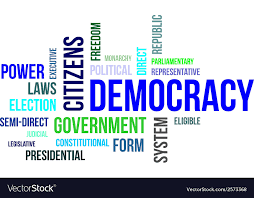
On Coups and Reconciliation
I usually give myself a week to write a blog post so that I have enough time to do some research and put my prose though a few drafts.
All that went out the window on January 6, when insurgents—who were urged on by the President—tried to stage a coup.
 I don’t have much to add on the specifics of what happened other than to refer you to the Alliance for Peacebuilding’s statement or the dozens like it which are beginning to fill all of our inboxes.
I don’t have much to add on the specifics of what happened other than to refer you to the Alliance for Peacebuilding’s statement or the dozens like it which are beginning to fill all of our inboxes.
If I do have anything to add, it comes from the fact that I wear two professional hats, the second of which is more important today. Both, though, tell us that we have a lot of work to do.
As a political scientist, I’m tired of claims that the United States has the oldest and most secure democracy. I’ve found those arguments questionable—and more—for half a century. That said, I was still taken by surprise when my country flunked a key test that any regime has to pass before it can claim to have a stable and secure democracy. Whatever happens in the next two weeks, we have already failed make a peaceful transition from one administration to the next.
Sure, President Biden will be inaugurated, and our institutions will survive.
But, we will never be able to live down the shame of what happened yesterday. We can no longer get away with the claim that we are leading the democratic world without being laughed at or worse. As I said to my wife last night, I’m glad I decided not to write the eleventh edition of my comparative politics textbook….
I now spend most of my professional life as a peacebuilder with a special interest in paradigm shifts, complex wicked problems, and reconciliation. From that perspective, Wednesday’s events were particularly unsettling because I had planned to spend the afternoon half listening to the joint session of Congress and half putting the final touches on an article on reconciliation which I’m writing for Beyond Intractability—a draft of which appeared as blog post here last month.
Working on that piece while the exact opposite of reconciliation was unfolding ten miles from my house led me to a paradoxical conclusion. Wednesday’s events showed us more clearly than ever that we need the healing that reconciliation can provide. They also showed us how hard it is going to be to heal the wounds that this country has suffered over the past few hours, years, decades, and centuries. Whatever happens in the immediate aftermath of this week’s crisis, we have to put the insurgency in its larger context that includes the Trump presidency, COVID, polarization, populism, economic disparity, climate change, centuries of systemic racism, and more.
 As my attention kept shifting from the threat to democracy unfolding on my television screen to the lofty words on my iMac, I found myself returning to one of the most important misconceptions about reconciliation and peacebuilding in general that I’ve heard again and again during the Trump presidency. Reconciliation is not the equivalent of a get out of jail free card in a board game. It is a long, complicated, and agonizing process that involves the simultaneous search for truth, justice, peace, and mercy as my friend and colleague John Paul Lederach puts it. You can’t envision reconciliation without making huge progress on all of the dimensions included in this word cloud
As my attention kept shifting from the threat to democracy unfolding on my television screen to the lofty words on my iMac, I found myself returning to one of the most important misconceptions about reconciliation and peacebuilding in general that I’ve heard again and again during the Trump presidency. Reconciliation is not the equivalent of a get out of jail free card in a board game. It is a long, complicated, and agonizing process that involves the simultaneous search for truth, justice, peace, and mercy as my friend and colleague John Paul Lederach puts it. You can’t envision reconciliation without making huge progress on all of the dimensions included in this word cloud
Reconciliation processes are best known for their use of restorative justice and their desire to create more harmonious relationships. But they only work when they give equal importance to seeking the truth and achieving justice. Put simply, the most successful ones are known as truth and reconciliation for a reason.
Once the shock wore off, it became clear to me that the truth-telling part of reconciliation has to be at the top of our list of priorities in the next weeks, but that we also have to keep the remaining points in my bullet list on center stage as we sort out what happened and what we should do about it.
- People are held accountable for their actions
- The truth about what happened is explored and the overwhelming majority of the population on all sides of the dispute accepts that “narrative.”
- Individuals and organizations who committed abuses acknowledge and apologize for their actions
- Significant policy changes are made that address the issues at stake
- Only then can a community or country even think of forgiveness
In some cases, that will involve holding people criminally responsible for their actions. More often than note, I hope we will be able to use restorative justice principles. But. however the events of the next few weeks evolve and whatever changes I end up making to the Beyond Intractability article, we have to keep one of last summer’s top slogans in our minds and in our hearts because it took on new meaning on Wednesday.
No justice, no peace.
As I said in an email to my friend Liz Hume in the middle of Wednesday afternoon, “we have a lot of work to do.”
The views and opinions expressed in this article are those of the author and do not necessarily reflect the official policy or position of the Alliance for Peacebuilding or its members.
Also published on Medium.
